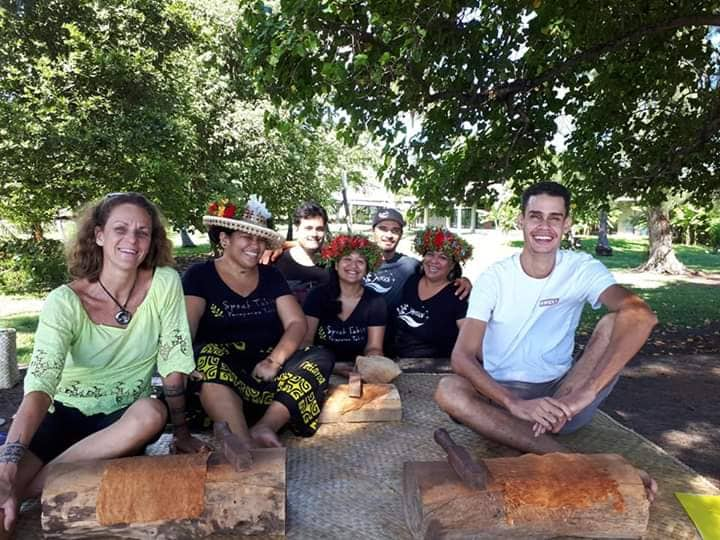Co-Founder of Speak Tahiti, Heiura Itae-Tetaa | Making the Tahitian language more accessible
Heiura Itae-Tetaa | Co-Founder of Speak Tahiti - Paraparau Tahiti | Presenting at 2019 TedX Papeete
Born in Arue, Tahiti, Heiura Itae-Tetaa wants to make learning the reo Tahiti (Tahitian language) more accessible via her startup, Speak Tahiti - Paraparau Tahiti. “I think it’s important to keep our language alive and share our culture with the world.”
Tell us about where you grew up and your career path leading up to Speak Tahiti.
I feel like I’m part of this generation that will never stay put in one place. After getting my undergraduate degree at ISEPP in Tahiti, I pursued my Master’s in Sociology and Communications in France. I stayed in Angers for quite a while and enjoyed discovering a completely different culture. I fell in love though, and returned to Tahiti.
While I was getting my undergraduate degree, I was a host at the Heiva i Tahiti (Tahiti’s annual cultural event showcasing dance, story and stories). When I returned from my Master’s, I was immediately hired to work for Tahiti’s Ministry of Youth and Sports.
I had always wanted to become a journalist though — I loved writing, public speaking, and ended up writing for documentaries about 8 years ago. In that capacity, I worked as assistant producer for film productions. I was a journalist for the now defunct Les Nouvelles de Tahiti, and I was also at the inception of a Tahitian women’s magazine, Hine, working as a journalist, too.
You are now the co-founder of Speak Tahiti. How has is it been getting your startup off the ground?
The idea for Speak Tahiti-Paraparau Tahiti started 10 years ago when I was trying to learn Tahitian at La Maison de la Culture (House of Culture) and through a university curriculum.
Even though I took all the available language courses in Tahiti, I still experienced a nuanced barrier to the language and never felt like I had completely mastered the reo.
Three years ago, I got pregnant, and like all future parents, I thought about what I wanted to teach my baby girl. The desire to teach my daughter the reo Tahiti popped up in my mind. I decided that I wanted to learn the language for myself and for the benefit of my daughter.
I started thinking — there are all of these English immersion classes in Tahiti, so why isn’t there a Tahitian immersion class?
I decided to launch a pilot program: I found Tahitian families willing to lead trips and prototyped immersions. We now do all sorts of outings like a pirogue navigation course (École de pirogue à voile traditionelle), museum outing, singing chorus course (Tahiti Choir School) and coffee course (Kerekere Coffee Tahiti). We also facilitate Tahitian language courses. Over the last month, we’ve already done 4 cultural immersions, one focused on the tapa in partnership with the Musée de Tahiti and ‘Ariori Cultural Center.
It’s super exciting, because we have so many opportunities here in the Islands and out of our country.
Heiura Itae-Tetaa, co-founder of Speak Tahiti-Paraparau Tahiti, at a cultural workshop
How are you funding this initiative?
We have no investors. We’re doing this on our own with the help of PRISM, an incubator for Tahitians. Hopefully we will get governmental help in the future.
What does Speak Tahiti offer its students?
We offer in-person and e-learning reo courses. Before each in-person class, we send the students a 3 minute video with some course content. In this globalized and modernized era, we need to adapt our learning styles to make the learning more accessible.
In June, we’re testing our product on the Hispanic market in Chile. By the end of the year, we hope to have our classes offered in Spanish, English and Japanese. It would be amazing to see these language courses for other Pacific indigenous languages. I’m grateful for this digital revolution. It’s a tool for us to keep our culture and identity alive.
Heiura Itae-Tetaa | Cultural Workshop
Do you have any advice for Pacific Islander entrepreneurs?
Reinvest some of your company’s profits into your community. With every immersion package sold, some money goes back to the Tahitian community.
Be open and willing to share your ideas. The more you talk about your ideas, the more people help make your ideas a reality.
Stay humble. We know our solution isn’t the best solution, but one of many solutions. I came into this opportunity with a lot of humility. I know I’m not the best Tahitian speaker, but I’m doing it because I see a need.
Author
Marushka Hirshon is a Tahitian-American nonprofit founder, community organizer and freelance journalist. She graduated from Stanford University with a B.S. in Science, Technology and Society with a focus in Environment and Sustainability. Follow



